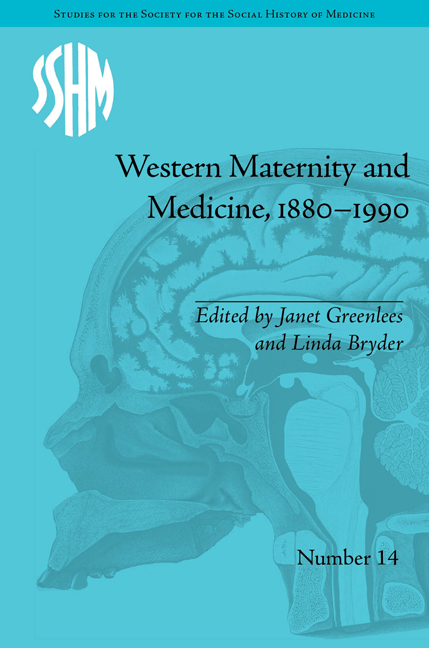Book contents
- Frontmatter
- CONTENTS
- Acknowledgements
- List of Contributors
- List of Tables
- Western Maternity and Medicine: An Introduction
- 1 Safely Delivered? Insights into Late Nineteenth-Century Australian Maternity Care from Coronial Investigations into Maternal Deaths
- 2 Pregnancy, Pathology and Public Morals: Making Antenatal Care in Edinburgh around 1900
- 3 ‘The Peculiar and Complex Female Problem’: The Church of Scotland and Health Care for Unwed Mothers, 1900–1948
- 4 Taking ‘Advantage of the Facilities and Comforts … Offered’: Women's Choice of Hospital Delivery in Interwar Edinburgh
- 5 ‘What Women Want’: Childbirth Services and Women's Activism in New Zealand, 1900–1960
- 6 'Twixt God and Geography: The Development of Maternity Services in Twentieth-Century Ireland
- 7 Test Tubes and Turpitude: Medical Responses to the Infertile Patient in Mid-Twentieth-Century Scotland
- 8 Women's Experiences of the Maternity Services in Berkshire and Oxfordshire, c. 1970–1990
- 9 From Muller to Johnson Controls: Mothers and Workplace Health in the US, from Protective Labour Legislation to Fetal Protection Policies
- Notes
- Index
6 - 'Twixt God and Geography: The Development of Maternity Services in Twentieth-Century Ireland
- Frontmatter
- CONTENTS
- Acknowledgements
- List of Contributors
- List of Tables
- Western Maternity and Medicine: An Introduction
- 1 Safely Delivered? Insights into Late Nineteenth-Century Australian Maternity Care from Coronial Investigations into Maternal Deaths
- 2 Pregnancy, Pathology and Public Morals: Making Antenatal Care in Edinburgh around 1900
- 3 ‘The Peculiar and Complex Female Problem’: The Church of Scotland and Health Care for Unwed Mothers, 1900–1948
- 4 Taking ‘Advantage of the Facilities and Comforts … Offered’: Women's Choice of Hospital Delivery in Interwar Edinburgh
- 5 ‘What Women Want’: Childbirth Services and Women's Activism in New Zealand, 1900–1960
- 6 'Twixt God and Geography: The Development of Maternity Services in Twentieth-Century Ireland
- 7 Test Tubes and Turpitude: Medical Responses to the Infertile Patient in Mid-Twentieth-Century Scotland
- 8 Women's Experiences of the Maternity Services in Berkshire and Oxfordshire, c. 1970–1990
- 9 From Muller to Johnson Controls: Mothers and Workplace Health in the US, from Protective Labour Legislation to Fetal Protection Policies
- Notes
- Index
Summary
In 1922, the southern twenty-six counties of Ireland secured political independence from Britain with the foundation of the Irish Free State. The new state was no blank canvas, of course, as it proceeded to govern based on the legacy, infrastructure and legislation of hundreds of years of British rule. Nowhere was this more apparent than in the arena of public health: pre-1922 legislation relating to the medical treatment of the poor and destitute, compulsory vaccination, the registration and notification of births and deaths and the role of local government in public health were to provide the framework of the Irish Free State's approach to health. The Ireland of the early twentieth century was also focused on controlling infectious diseases, regulating midwifery (lest the country became ‘the dumping ground for the inepts [sic] of Great Britain’), and reducing maternal and infant mortality.
Ireland was a predominantly rural, agrarian and traditional society, dominated by Roman Catholicism with a highly conservative moral climate. Irish public debate continued throughout the twentieth century to display suspicion of the state and central government. The Roman Catholic hierarchy was often perceived, and indeed portrayed itself as, a counterweight to the perils of undue state control or interference.
- Type
- Chapter
- Information
- Western Maternity and Medicine, 1880–1990 , pp. 99 - 112Publisher: Pickering & ChattoFirst published in: 2014



